Pansy power: Guerrilla gardening fights homophobic hate
- Published
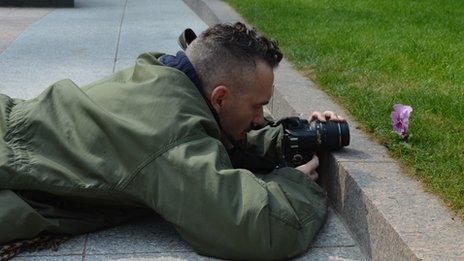
Paul Harfleet is planning to plant 100 pop-up pansies in London this summer
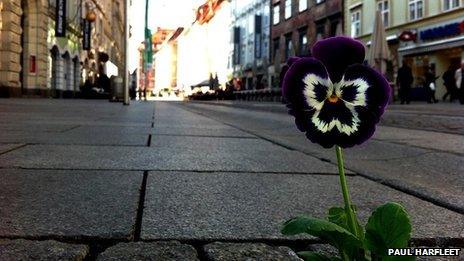
Harfleet has previously planted pansies in Turkey, the United States and Austria
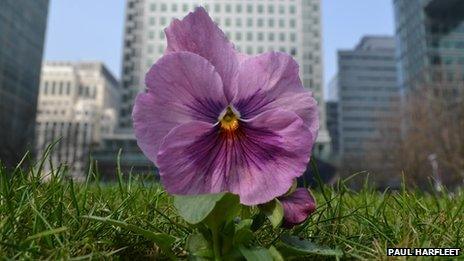
The guerilla gardener planted the first of the pansies in Canary Wharf this week
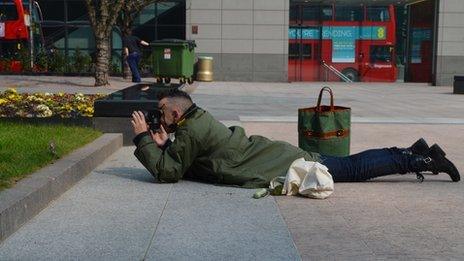
Harfleet intends to photograph each pansy, and name it after whatever abusive phrase was thrown at the location
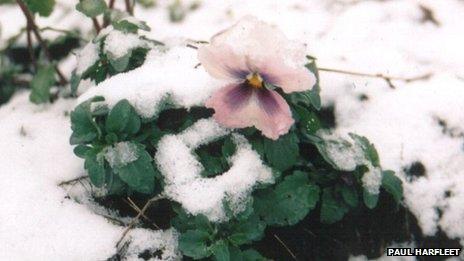
This photo, taken in Manchester, is called 'I think it's time we went gay bashing again'
He has been called an installation artist, a guerrilla gardener, a photographer and even a therapist.
But Paul Harfleet prefers to describe himself as an "accidental activist".
Mr Harfleet, 37, is the green-fingered man behind the Pansy Project, where a solitary flower is planted in the nearest soil to the spot where homophobic abuse has reportedly happened.
His pop-up planting has previously focussed on Manchester and Liverpool, but this summer, he plans to plant a pansy in 100 sites across London.
Mr Harfleet, from west London, intends to photograph each pansy, and name it after whatever abusive phrase was thrown.
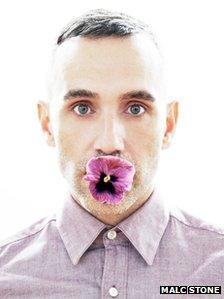
Paul Harfleet has been planting pansies for eight years
'Gay-bashing'
The project aims to highlight homophobic attacks by planting seeds of hope for those affected by them.
In London, there was a 14% rise in homophobic crime for the period May 2008 to November 2011, compared with the period October 2004 and April 2008, according to the mayor's office for policing and crime.
More recent Metropolitan Police figures show reported homophobic crime in the year to February 2012 decreased by 11.5%.
But in the boroughs of Enfield, Newham, Redbridge, reported homophobic crime more than doubled.
Mr Harfleet says his project is "not statistical, but more of an anecdotal capturing of hate crime".
A string of homophobic abuse on a warm 2005 summer's day in Manchester was the catalyst for his project.
"The day began with two builders shouting in my direction 'It's about time we went gay-bashing again isn't it?'" he says.
"Later on, two people shouted homophobic obscenities from a car window.
"The day ended with a bizarre and unsettling confrontation with a man who called my then boyfriend and I 'Ladies' under his breath."
'Peaceful and sad'
When he later told his friends about his experiences, "they couldn't believe this kind of thing still happened at all".
"That made me think I should do something about it," Mr Harfleet said
He was initially unsure on the type of flower to plant, but discovered the name "pansy" originates from the French word pensée meaning "thought", as the bowing head of the flower is seen to visually echo a person's face in deep thought.
"The pansies are still, peaceful and sad - that's what I like about them," he says.
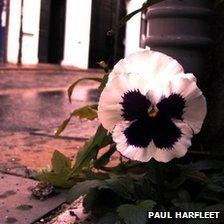
The photo 'Queer' was taken on Hill Street, Belfast
But it was only when he started planting, he began to realise the cathartic effect it could have.
"I began to realise instances of homophobia build up in your head and you don't realise you are carrying them with you," he said.
"Victims of abuse brush these things under the carpet, but the experiences linger with you."
When he planted his first pansy, it changed his "feelings towards the location", he said.
"I was acknowledging what had happened but overlaying the memory with something positive.
"Some people don't get it and think I'm perpetuating a derogatory term for gayness by planting the pansy.
"But, most people understand it's a positive thing I do."
Eight years on, he has demonstrated that sometimes the simplest ideas can be the most effective, having planted thousands of pansies in a project that has taken him as far afield as Istanbul and New York.
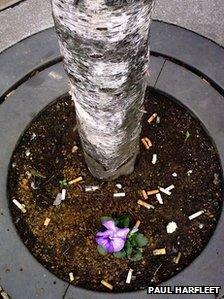
'Batty Boy' planted in Exchange Square in Manchester
"When people see the photos, they appreciate the shocking contrast between the flower and the homophonic abuse that was given," he said.
High-profile cases
People have taken to social media to tell him about locations where abuse has happened.
This week, he planted his first flower of his project, in Canary Wharf, east London.
"This is where a bunch of youths passed me in a shopping centre, and called me a 'faggot'," he said.
He planted the pansy on the nearest patch of grass to the shopping centre.
"They contrast between the solitary pansy and the high rise urban environment it was planted is profound," he said.
Next week, he plans to begin planting flowers at locations where more high profile homophobic abuse cases have happened.
He intends to start with the site where Jody Dobrowski was killed on Clapham Common, south west London, in 2005.
As far as this summer's target is concerned he says, "planting 100 pansies in London is possibly unrealistic, but it's good to have a goal".
- Published22 January 2013
- Published22 February 2011